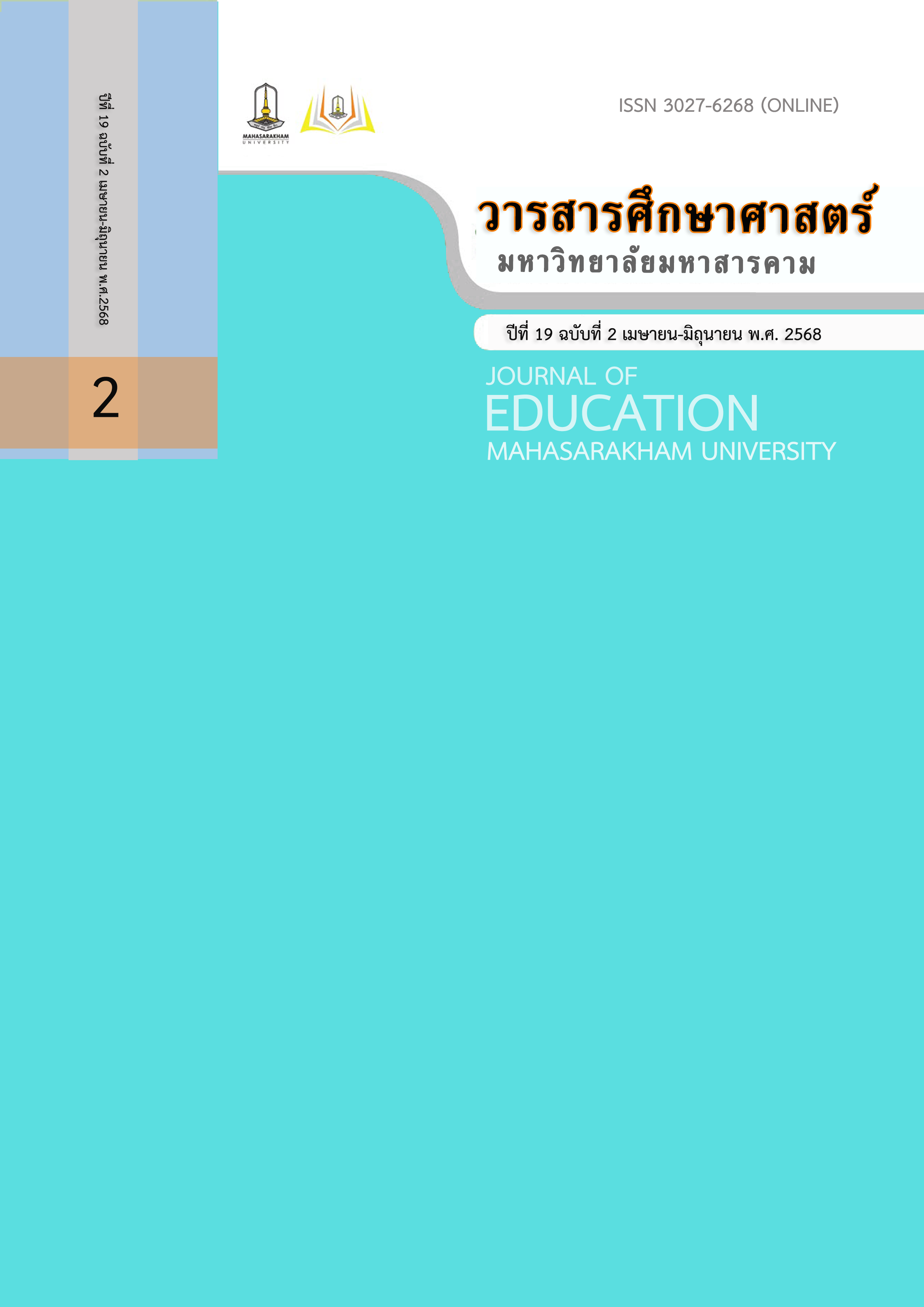Factors Affecting Entrepreneurial Attitudes And Guidelines to Develop Entrepreneurship competencies of Students at King Mongkut's University of Technology North Bangkok
Main Article Content
Abstract
This research aims to 1) examine the internal and external factors influencing students' attitudes toward entrepreneurship, 2) investigate fundamental entrepreneurial knowledge that affects these attitudes, and 3) explore approaches for fostering entrepreneurship in higher education. A mixed-methods research design was employed, utilizing questionnaires and interviews. The sample consisted of 376 undergraduate, master's, and doctoral students selected through stratified random sampling, along with seven administrators and faculty members chosen through purposive sampling. Data were analyzed using descriptive statistics and multiple regression analysis.
The findings revealed that significant internal factors influencing students' entrepreneurial attitudes included systematic planning skills, the ability to develop projects with commercial potential, and independent decision-making. External factors included social trends favoring convenience, as well as the increasing interest of younger generations in entrepreneurship. The fundamental knowledge areas affecting entrepreneurial attitudes comprised economics, finance, accounting, marketing, information technology, and communication.
The proposed approaches for enhancing entrepreneurship in universities include: 1) integrating courses to develop soft skills related to entrepreneurship, 2) incorporating engineering, science, and social sciences into entrepreneurship education, 3) promoting faculty members with entrepreneurial experience, 4) providing students with opportunities to participate in extracurricular activities, 5) organizing competitions and fostering alumni collaboration, 6) establishing innovation labs for hands-on learning, 7) supporting entrepreneurship advisors, and 8) creating a funding mechanism to assist student startups.
Downloads
Article Details

This work is licensed under a Creative Commons Attribution-NonCommercial-NoDerivatives 4.0 International License.
References
กองแผนงาน มหาวิทยาลัยเทคโนโลยีพระจอมเกล้าพระนครเหนือ. (2565). รายงานประจำปี 2565. พิมพ์ครั้งที่ 1. กรุงเทพฯ : บริษัท ซีโน พับลิชชิ่ง แอนด์ แพคเกจจิ้ง จำกัด.
จงพิศ ศิริรัตน์ และคณะ. (2547). สภาพแวดล้อมทางธุรกิจโครงการหนึ่งตำบลหนึ่งผลิตภัณฑ์ (OTOP). (รายงานการวิจัย). สงขลา : มหาวิทยาลัยสงขลานครินทร์.
จริยา กอสุขทวีคูณ. (2561). การศึกษาแรงจูงใจและความตั้งใจในการเป็นผู้ประกอบการของนักศึกษา ระดับอุดมศึกษาในประเทศไทย (วิทยานิพนธ์ปริญญาการจัดการมหาบัณฑิต). มหาวิทยาลัย กรุงเทพ, ปทุมธานี.
ชลิตา บุญนภา. (2557). การศึกษาคุณลักษณะของผู้ประกอบการ และโอกาสของธุรกิจที่มีผลต่อความสำเร็จของผู้ประกอบการธุรกิจวัสดุก่อสร้างในเขตกรุงเทพมหานคร. การค้นคว้าอิสระบริหารธุรกิจมหาบัณฑิต บัณฑิตวิทยาลัย มหาวิทยาลัยกรุงเทพ.
ณัฐ อมรภิญโญ. (2556). “รูปแบบการประสบความสําเร็จที่ยั่งยืนของผู้ประกอบการรายย่อยในภาคตะวันออกเฉียงเหนือตอนบน ประเทศไทย.” วารสารวิชาการศรีปทุม ชลบุรี. 9(3) : 57-66.
บัณฑิตวิทยาลัยการจัดการและนวัตกรรม มหาวิทยาลัยเทคโนโลยีพระจอมเกล้าธนบุรี. (2562). รายงานประจำปี ปีการศึกษา 2562. พิมพ์ครั้งที่ 1. กรุงเทพฯ : มหาวิทยาลัยเทคโนโลยีพระจอมเกล้าธนบุรี.
พรทิพย์ ม่วงมี ดุษฎี โยเหลา และภิญญาพันธ์ ร่วมชาติ. (2555). “ปัจจัยทางจิตและสังคมที่เกี่ยวข้องกับความตั้งใจเป็นผู้ประกอบการของนักศึกษาชั้นปีที่ 4 มหาวิทยาลัยธรรมศาสตร์.” วารสารพฤติกรรมศาสตร์เพื่อการพัฒนา. 4(1) : 74-82.
ไพโรจน์ ปิยะวงศ์วัฒนา. (2561). การจัดการเชิงกลยุทธ์ : เทคโนโลยีและนวัตกรรม. พิมพ์ครั้งที่ 6. กรุงเทพฯ : สำนักพิมพ์แห่งจุฬาลงกรณ์มหาวิทยาลัย.
มารยาท โยทองยศ และทรงวาด สุขเมืองมา. (2559). “ปัจจัยที่มีอิทธิพลต่อความตั้งใจที่จะเป็นผู้ประกอบการของนักศึกษาปริญญาตรีกรณีศึกษา มหาวิทยาลัยกรุงเทพ.” วารสารสุทธิปริทัศน์. 30(95) : 103-115.
ศุภิสรา โภชาดม. (2563). ปัจจัยที่ส่งผลต่อความตั้งใจเป็นผู้ประกอบการธุรกิจ Startup ของนักศึกษาปริญญาตรี ชั้นปีที่ 4 ในอำเภอหาดใหญ่จังหวัดสงขลา. วิทยานิพนธ์บริหารธุรกิจมหาบัณฑิต บัณฑิตวิทยาลัย มหาวิทยาลัยหาดใหญ่.
สําคัญสุด สีหตุลานนท์. (2560). ปัจจัยแวดล้อมภายนอกที่เกื้อหนุนต่อการเป็นผู้ประกอบการรุ่นเยาว์ กรณีศึกษา นักศึกษาคณะวิทยาการจัดการ มหาวิทยาลัยศิลปากร วิทยาเขตสารสนเทศเพชรบุรี. วิทยานิพนธ์บริหารธุรกิจมหาบัณฑิต สาขาวิชาหลักสูตรบริหารธุรกิจมหาบัณฑิต บัณฑิตวิทยาลัย มหาวิทยาลัยศิลปากร.
สำนักงานปลัดกระทรวงการอุดมศึกษา วิทยาศาสตร์ วิจัย และนวัตกรรม. (2563). (ร่าง) แผนด้านการอุดมศึกษาเพื่อผลิตและพัฒนากำลังคนของประเทศ. พิมพ์ครั้งที่ 1. กรุงเทพฯ : สำนักงานปลัดกระทรวงการอุดมศึกษา วิทยาศาสตร์ วิจัย และนวัตกรรม.
สำนักงานเลขาธิการสภาการศึกษา. (2561). การจัดการศึกษาเพื่อพัฒนาความเป็นผู้ประกอบการ. พิมพ์ครั้งที่ 1. กรุงเทพฯ : สำนักวิจัยและพัฒนาการศึกษา กระทรวงศึกษาธิการ.
สำนักงานส่งเสริมวิสาหกิจขนาดกลางและขนาดย่อม. (2567). รายงานสถานการณ์วิสาหกิจขนาดกลางและขนาดย่อม. พิมพ์ครั้งที่ 1. กรุงเทพฯ : บริษัท วิชั่น พรีเพรส จํากัด.
สุกัญญา จันทกุล และคณะ. (2561). ปัจจัยที่สัมพันธ์กับความต้องการเป็นผู้ประกอบการในธุรกิจคหกรรมศาสตร์ของนักศึกษา คณะเทคโนโลยีคหกรรมศาสตร์ มหาวิทยาลัยเทคโนโลยีราชมงคลพระนคร. (รายงานการวิจัย). กรุงเทพฯ : มหาวิทยาลัยเทคโนโลยีราชมงคลพระนคร.
อนงค์ รุ่งสุข. (2559). ปัจจัยที่มีผลต่อความตั้งใจที่จะเป็นผู้ประกอบการของนักศึกษาคณะบริหารธุรกิจ มหาวิทยาลัยเทคโนโลยีราชมงคลรัตนโกสินทร์. ปริญญานิพนธ์บริหารธุรกิจบัณฑิต คณะบริหารธุรกิจ มหาวิทยาลัยเทคโนโลยีราชมงคลรัตนโกสินทร์.
Alexander, I. K. and Honig, B. (2016). “Entrepreneurial intentions : A cultural perspective.” Africa Journal of Management. 2(3): 235-257.
Bolton, D. L. and Lane, M. D. (2011). “Individual entrepreneurial orientation : Development of a measurement instrument.” Education+Training. 54(2/3) : 213-233.
Feder, E. S. and Nitu-Antonie, R. D. (2017). “Connecting gender identity, entrepreneurial training,role models and intentions.” International Journal of Gender and Entrepreneurship. 9(1) : 87-108.
Hlatywayo, C. K., Marange, C. S. and Chinyamurindi, W. T. (2017). “A hierarchical multiple regression approach on determining the effect of psychological capital on entrepreneurial intention amongst prospective university graduates in South Africa.” Journal of Economics and Behavioral Studies. 9(1) : 166-178.
Liñán, F. and Chen, Y. W. (2009). “Development and cross-cultural application of a specific instrument to measure entrepreneurial intentions.” Entrepreneurship : Theory and Practice. 33(3) : 593-617.
Souitaris, V. , Zerbinati, S. and Al-Laham, A. (2007). “Do entrepreneurship programmes raiseentrepreneurial intention of science? The effect of learning, inspiration and resources.” Journal of Business Venturing. 22(4) : 566-591.
Wu, S. and Wu, L. (2008). “The impact of higher education on entrepreneurial intentionsof university students in China.” Journal of Small Business and Enterprise Development. 15(4) : 752-774.


